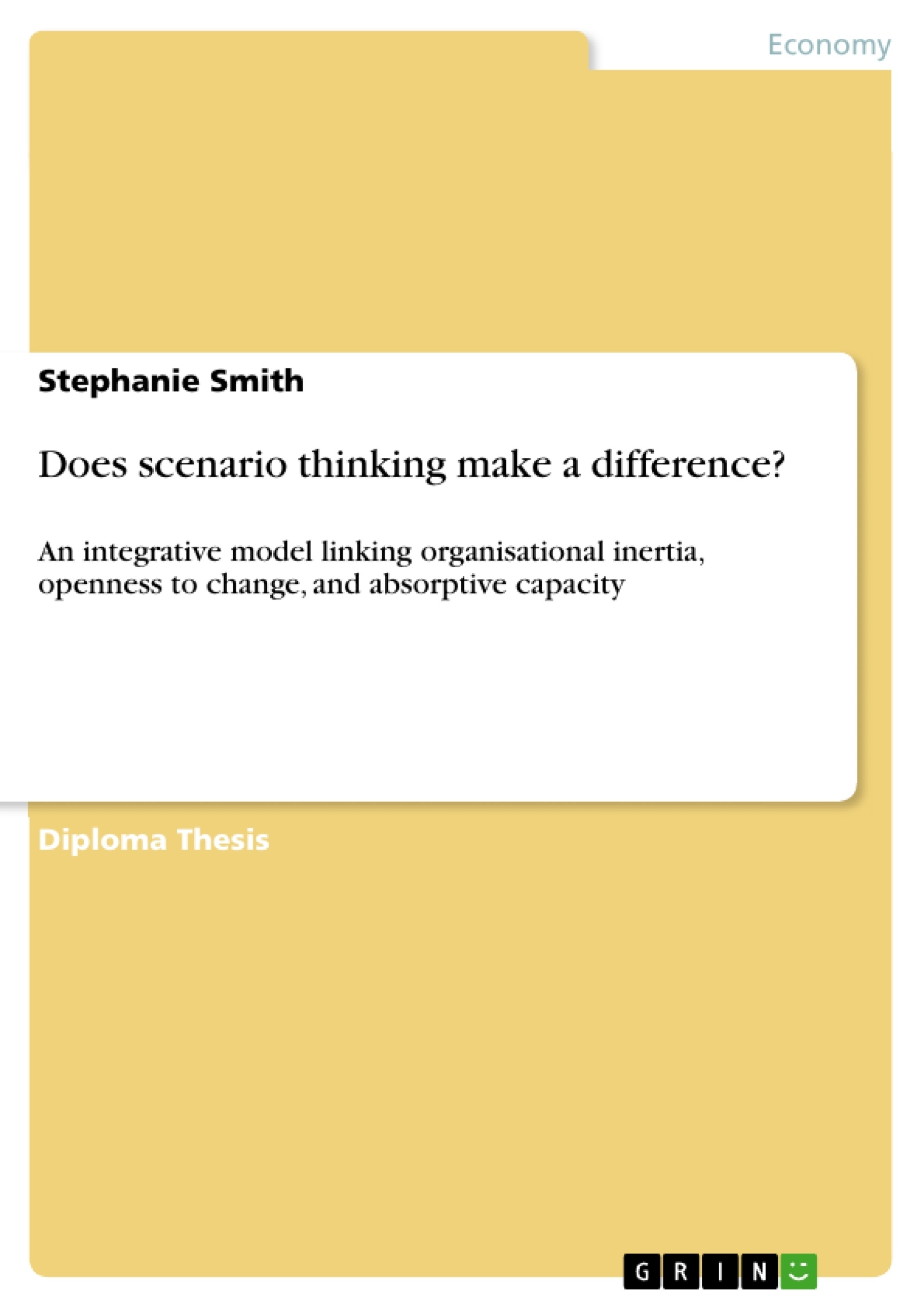Change has become an inevitable part of business life. Although this is an acknowledged fact and companies are aware of its importance, managing change as well as assuring flexibility is a complex undertaking, often unsuccessfully conducted
(Bacon et al., 2010; Clegg et al., 1997; Gibbs, 1997; Holman et al., 2000; IBM, 2004;Landauer, 1995; Lassen & Nielsen, 2009; Levasseur, 2010; Willcocks & Grint, 1997).
The questions subject to this thesis are: How can the
individual’s attitude towards change be altered? Does thinking in scenarios contribute to gaining a higher degree of openness to change? Does enhanced openness to change find expression in the individuals’ attitude towards new information? And do individuals, who experience an increased individual absorptive capacity, positively evaluate the effectiveness of practices that support the development of the capability to appreciate new information?
Since it represents a conceptual piece of work, propositions will constitute the results. However, a method to test the validation of the presented propositions is suggested, which provides a starting point to engage in future empirical investigations. The structure is the following: First, a theoretical background of organisational inertia (section 2.1), absorptive capacity (section 2.2), and
scenario planning (section 2.3) is given. Subsequently, the introduced deliberations on these theories are utilised to derive propositions that are unique and new in their nature (section
3.1). Furthermore, a possible method is suggested to test the model and to find support for the built up propositions (section 3.2). In chapter 4 the results, i.e. the propositions, as well as their contribution to theoretical understandings within the scope of the research field change,limitations of this work, and managerial implications are discussed. The conclusion (chapter
5) will finalise this thesis.
Inhaltsverzeichnis (Table of Contents)
- INTRODUCTION
- THEORETICAL BACKGROUND
- Organisational inertia
- Value of change
- Definition of organisational change
- Reality of change outcome
- Why change actions fail
- Absorptive capacity
- Definition
- Drivers
- Outcomes
- Scenario planning
- Definition
- Value of scenario planning
- Organisational inertia
- DOES SCENARIO THINKING MAKE A DIFFERENCE?
- An integrative model
- A micro-level perspective
- Influence of the individual's consciousness on his/her openness to change
- Role of scenario thinking
- Degree of openness to change
- How the degree of openness to change determines the organisation's absorptive capacity
- A proposed method
- Sample and data collection
- Variables and measurement validity
- An integrative model
- DISCUSSION
- Theoretical contributions
- Limitations
- Managerial implications
- CONCLUSION
Zielsetzung und Themenschwerpunkte (Objectives and Key Themes)
This diploma thesis investigates the impact of scenario thinking on organisational change. The study aims to develop an integrative model that connects organisational inertia, openness to change, and absorptive capacity.
- Organisational inertia and its impact on change initiatives
- The role of absorptive capacity in adapting to change
- The influence of scenario thinking on individual openness to change
- The relationship between openness to change and absorptive capacity
- The development of a proposed method to assess the effectiveness of scenario thinking
Zusammenfassung der Kapitel (Chapter Summaries)
The thesis begins with an introduction that sets the context for the research and outlines the objectives. Chapter 2 explores the theoretical background, covering concepts such as organisational inertia, absorptive capacity, and scenario planning. Chapter 3 introduces the integrative model, which examines the influence of scenario thinking on individual openness to change and the relationship between openness to change and absorptive capacity. It also presents a proposed method for data collection and analysis. Chapter 4 discusses the theoretical contributions of the study, acknowledges limitations, and offers managerial implications. The conclusion summarizes the key findings and suggests future research directions.
Schlüsselwörter (Keywords)
The study focuses on scenario thinking, organisational inertia, openness to change, absorptive capacity, and their interrelationships. It explores the impact of scenario thinking on organizational change by examining individual consciousness, openness to change, and absorptive capacity within an organizational context. The research uses an integrative model to analyze these concepts and proposes a method for investigating their effectiveness in promoting organizational adaptability.
Frequently Asked Questions
What is scenario planning in business?
Scenario planning is a strategic method used to visualize various future possibilities, helping companies prepare for uncertainty and manage change effectively.
What is organizational inertia?
Organizational inertia refers to a company's resistance to change, often caused by established routines, culture, or a lack of flexibility.
How does scenario thinking influence openness to change?
By thinking in scenarios, individuals can alter their attitude towards change, gaining a higher degree of openness to new information and perspectives.
What is absorptive capacity?
Absorptive capacity is an organization's ability to identify, assimilate, and apply new external knowledge for commercial purposes.
Why do many organizational change initiatives fail?
Failures are often due to a lack of individual openness to change and the inability of the organization to manage the psychological aspects of the transition.
- Citar trabajo
- Stephanie Smith (Autor), 2011, Does scenario thinking make a difference?, Múnich, GRIN Verlag, https://www.grin.com/document/177856



